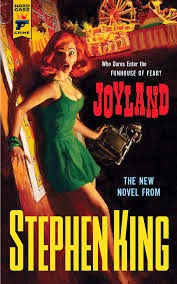Deal Me In Lite, R.I.P. Edition: Week 9
"Pay the Ghost" by Tim Lebbon
"Warm" by Robert Sheckley
This is the final week of my Peril of the Short Story adventure, culminating in Halloween tonight. The final two stories from my list of thirteen were definitely a mixed bag, however. First, though, the cards:
These corresponded to two stories from two different anthologies:
"Warm" by Robert Sheckley
This story comes from the Arbor House anthology, but it was originally published in the old Galaxy magazine, one of the pulp science fiction magazines from the 1950's. It's a weird little story that is oddly effective, although it takes a little while for the reader to understand what is happening.
The main character, Anders, is lying on his bed, waiting until it's time to go pick up his date, Judy, and take her out to a party. Suddenly he hears a voice in his head that says "Help me!" Surprisingly, Anders is not terribly concerned about this, and begins a conversation with the voice. The voice doesn't know where it is, but it can see with and through Anders, and it helps him to see the world differently as the evening progresses. With the coaching of the voice, which tells him when he is getting "warmer" or "colder" with his thinking (hence the title of the story), he becomes more and more distantly removed from the scenes around him. He begins to see other people as "articulated skeletons," "flesh machines," and even just collections of atoms. He eventually carries this kind of thinking to its logical conclusion (well, it seems logical in the story anyway) and gets in a real pickle, not to give away the end of the story. Suffice it to say, the ending is a real twist that I did not see coming, but it is entirely fitting.
"Pay the Ghost" by Tim Lebbon
This story, on the other hand, didn't do much for me -- which is a shame, really, because it's one of those stories that starts out very promisingly. And then somewhere along the way, it goes off the rails.
Lee and Kate lost their daughter, Moll, on Halloween a year before the story begins. She simply disappears from Lee's side that day after asking a very strange question: "Daddy, can we pay the ghost?" This is a question that Lee agonizes over, trying to figure it out over the weeks and months following Moll's disappearance. Predictably, Kate ends up leaving Lee, perhaps thinking that he was somehow responsible for losing Moll. Not so predictably, however, Kate now returns just a couple of days before Halloween rolls around this time, and she is completely changed. She's gaunt, sick, and half-crazed. But she claims she has found the man who is holding Moll captive. Apparently this man is holding Moll in a house along with other children. Kate convinces Lee to try and find the man and get Moll back. Lee has trouble finding the house, although he does stumble upon a burn pit near where Kate says the house is, and the pit is full of the charred remnants of bodies, and small bones. This is a tremendously disturbing image to both Lee and the reader. Soon it's clear that nothing is what it seems in this story, and the "man" holding Moll is not really a man, but something far more sinister. By this point, though, I was tremendously confused about the plot and the story just kind of fell apart for me. I wanted to like it, but... no. The ending is something of a twist, but in my book, a twist at the end only works if the reader thinks he or she understands what's happening up until that point, and I was adrift long before the ending of this story.
However, win, lose or draw, that's a wrap for both my Peril of the Short Story and my Peril the First ventures for this year's R.I.P. It was fun, and I plan to do it again next year!























.jpg)













